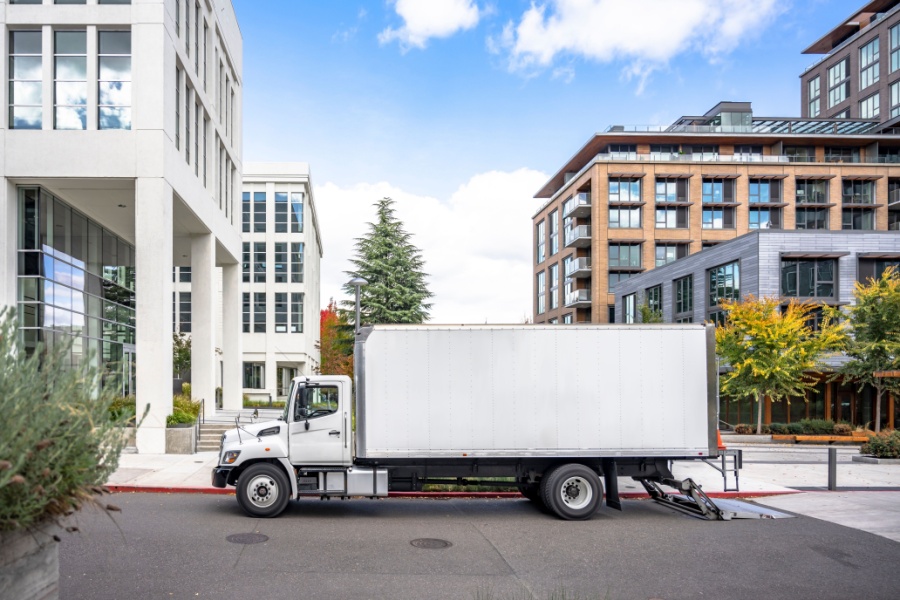Industries
Technology & Innovations
Semi Trucks
Logistics
Lease & Maintenance
Buy Used Trucks

The challenge of last mile delivery, particularly for large and bulky items, has become increasingly prominent. Consumers now expect the same level of speed and efficiency when receiving a couch as they do with smaller packages.
Large and bulky items, often termed as "non-conveyable products,” present unique challenges in last mile delivery, requiring specialized handling and white-glove installation services. Optimizing last mile delivery for these big and bulky products such as furniture, appliances, and exercise equipment involves several key strategies aimed at enhancing efficiency, reducing costs, and improving the overall customer experience.
In response to the increasing demand for seamless and efficient delivery experiences, companies are exploring innovative strategies to optimize last mile delivery for these specialized products.
This article delves into the evolving trends and solutions shaping last mile delivery, highlighting the crucial role of technology, forward deployment strategies, and the benefits of outsourcing to specialized providers.
Strategic Location Planning
One key strategy for optimizing last mile delivery is strategic location planning. By establishing distribution centers or fulfillment centers closer to end customers, companies can minimize transit times and streamline the delivery process. This forward deployment approach ensures faster deliveries, reduces transportation costs, and enhances customer satisfaction by providing quicker access to big and bulky items.
Technology Integration
Technology plays a crucial role in optimizing last mile delivery for big and bulky products. Companies are leveraging advanced last mile technology solutions such as GPS tracking, mobile apps, and customer portals to provide real-time visibility and tracking for deliveries. These tools empower customers with accurate information about their shipments, including real-time tracking updates and estimated delivery times, enhancing transparency and trust in the delivery process.
White-Glove Delivery Services
Offering white-glove delivery services is another effective strategy for optimizing last mile delivery of big and bulky products. This specialized service includes handling, assembly, and installation of high-value or fragile items, tailored to meet the unique requirements of each product. By providing an extra level of care and attention, companies can ensure the safe and efficient delivery of these items, enhancing customer satisfaction and loyalty.
Flexible Scheduling Options
Flexible scheduling options are essential for accommodating the diverse needs of customers receiving big and bulky products. Companies are offering self-scheduling tools that allow customers to choose convenient delivery time slots, reducing missed deliveries and enhancing flexibility. Empowering customers to select their preferred delivery windows improves satisfaction and reduces the need for re-deliveries, contributing to a smoother delivery experience.
Efficient Route Planning
Efficient route planning is critical for optimizing last mile delivery and maximizing operational efficiency. Companies are utilizing route optimization software to plan the most efficient delivery routes based on factors such as traffic patterns, delivery windows, and customer locations. By streamlining delivery routes, companies can minimize travel time, reduce fuel consumption, and improve on-time delivery performance.
Reverse Logistics Management
Efficient management of reverse logistics is essential for handling returns and exchanges of big and bulky products. Companies are implementing streamlined processes for product returns, including inspection, refurbishment, and restocking. By facilitating hassle-free returns, companies can enhance customer satisfaction and loyalty while minimizing the impact on operational efficiency.
Collaboration with Third-Party Logistics Providers (3PLs)
Partnering with specialized third-party logistics providers (3PLs) is another strategy for optimizing last mile delivery. By leveraging the expertise and resources of experienced logistics providers, companies can enhance service levels, expand delivery coverage, and improve operational efficiency. Outsourcing last mile delivery to trusted 3PLs allows companies to focus on core competencies while benefiting from specialized expertise and infrastructure.
Ryder, a prominent player in the logistics industry, has made significant strides in addressing the complexities of last mile delivery. Ryder's holistic approach to last mile delivery, backed by technology, strategic deployment strategies, and a commitment to continuous improvement, enables companies to meet evolving customer expectations and gain a competitive edge in the dynamic logistics landscape. One of the advantages of Ryder's national network is its ability to streamline reverse logistics processes. As online purchases of bulky goods increase, efficient management of returns becomes paramount. Ryder's fulfillment centers play a crucial role in this aspect by holding returned products and swiftly reallocating them to fulfill new orders. This approach has proven successful in reducing order-to-receipt cycles, exemplified by a medical equipment manufacturer experiencing a significant decrease from 10 to 14 days to just 48 hours.
Optimizing last mile delivery for big and bulky products requires a combination of strategic planning, technology integration, and customer-centric solutions. By implementing these strategies, companies can enhance the efficiency, reliability, and overall customer experience of last mile delivery, gaining a competitive edge in the market.